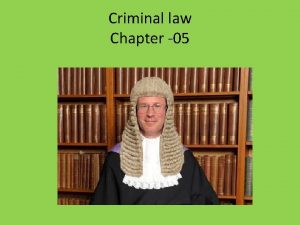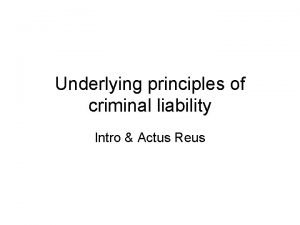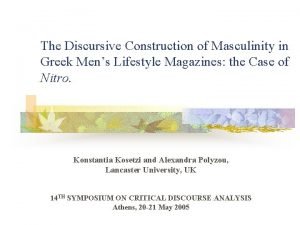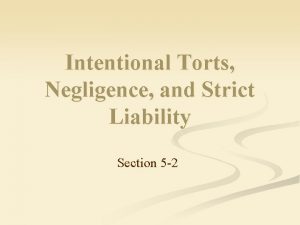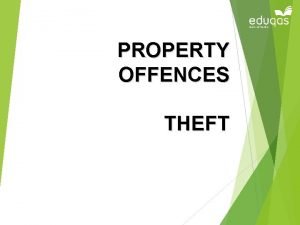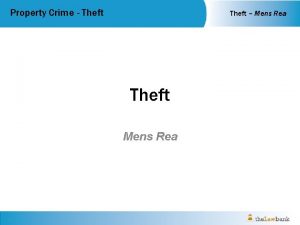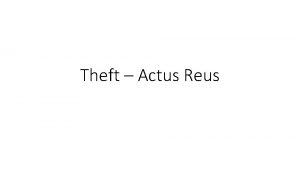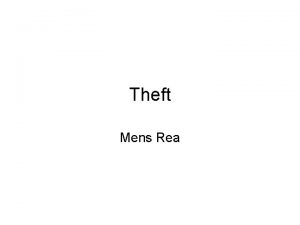Theft Mens Rea Definition S 1 Theft Act











- Slides: 11

Theft – Mens Rea

Definition • S. 1 Theft Act 1968 – Dishonest appropriation of property belonging to another with the intention of permanently depriving the other of it Theft Actus Reus Appropriation Property Mens Rea Belonging to another Dishonest Intention to permanently deprive the other of it

Dishonestly • Dishonestly not defined in Theft Act – assumed that everyone would know what the word meant • S. 2(1) Theft Act 1968 gives specific situations where a person would not be deemed to be dishonest: a) If he appropriates the property in the belief that he has in law the right to deprive the other of it b) If he appropriates the property in the belief that he would have the other’s consent if the other knew of the appropriation and the circumstances of it c) If he appropriates the property in the belief that the person to whom the property belongs cannot be discovered by taking reasonable steps

Dishonestly – S. 2(1) a) – the belief that he has in law the right to deprive the other of it • Subjective test – requires an honest, but not necessarily reasonable belief by D that it is his right to take the item • Small – D noticed an old and very scruffy car parked in the road for over a week, with the key in the ignition. Parts were missing and there was no petrol in it. D thought the car had been dumped and decided to get it going and drive it. D claimed he believed it had been abandoned and therefore he had a legal right to take it, even though the owner could have been found from the registration number

Dishonestly – S. 2(1) b) - the belief that he would have the other’s consent • Subjective test – requires an honest belief by D that he would have the owner’s consent • E. g. : • Borrowing between friends and neighbours • A continuing practice where consent has been given in the past • Returning the property after using it

Dishonestly – S. 2(1) c) - the belief that the person to whom the property belongs cannot be discovered by taking reasonable steps • Usually finding items and then keeping them • Subjective test – requires an honest belief by D that owner can’t be found by taking reasonable steps • DO NOT have to actually take reasonable steps to recover them • E. g. finding a £ 1 coin in the street – usually an honest belief that owner could not be reasonable found – would not be the case if D had just seen someone drop it. The more valuable the item, the less likely the owner cannot be reasonably found

Test for Dishonesty • Where one of the exceptions under S. 2(1) don’t apply, courts have developed a test for dishonesty • Ghosh – set out a 2 part test for dishonesty known as the Ghosh test: 1. Would D’s behaviour be regarded as dishonest by the standards of reasonable and honest people? • If the answer is “no” – D is not guilty as he has not been dishonest • If the answer is “yes” – the 2 nd question must be asked 2. Was D aware that his conduct would be regarded as dishonest by reasonable and honest people? • 1 st part of test is objective, 2 nd part of test is subjective • If both parts are satisfied, D is dishonest

Dishonesty – Being Willing to Pay • S. 2(2) Theft Act 1968 – the fact that D is willing to pay for the property does not mean he is acting honestly

Intention to Permanently Deprive • General rule – borrowing something does not form an intention to permanently deprive • S. 6(1) Theft Act 1968 – D will be regarded as having the intention to permanently deprive the other of it if his intention is to treat the thing as his own: • To dispose of the property regardless of the other’s rights; or • A borrowing or lending making it equivalent to outright taking or disposal

Intention to Permanently Deprive - Cases • DPP v J and Others – D took and broke V’s headphones then gave them back. Court held D had intention to permanently deprive • Lloyd – D worked as a projectionist at a cinema. D took films from the cinema to be copied. Films only out of cinema for a few hours and were always back in time for their projection to take place at the advertised times. Not convicted of theft – mere borrowing not intention to permanently deprive unless the intention is to return the thing in such a changed state that it can be said that all its goodness or virtue has gone • Velumyl – D took £ 1050 from company safe without authority and contrary to company rules. Took money on Saturday evening, lent the money to a friend on condition that it would be returned on Monday. Spot check took place before the money was returned. Court held that D had no intention to return the same actual bank notes, just the equivalent amount of money – therefore had an intention to permanently deprive • Lavender – D lived with girlfriend. Girlfriend was the tenant of the council house. She asked council to replace damaged doors but council refused as she was responsible for any damage to the doors. Council also owned another property on the same road which was unoccupied. D took 2 doors from that property to replace the doors at his girlfriend’s house. His intention was to use the doors for as long as he stayed at the property and then to leave them there when he left. D argued that swapping doors did not amount to theft as he did not intend to permanently deprive the council of

Conditional Intent • Conditional Intent – where D intends to steal something if there is anything worth stealing. • Easom – D picked up woman’s handbag to see if the contents were worth stealing. When he discovered there was nothing of value in the bag he put it back. Court held conditional intent is insufficient for the MR of theft. Intention to permanently deprive is only formed once D has decided there is something worth stealing



